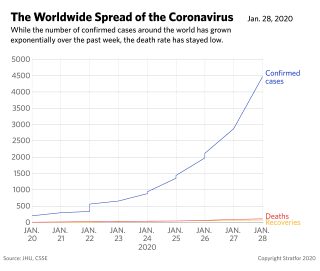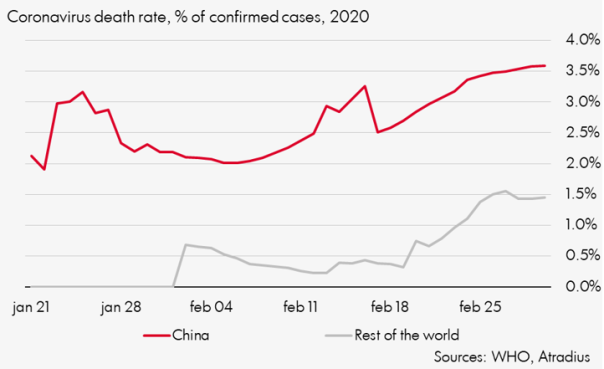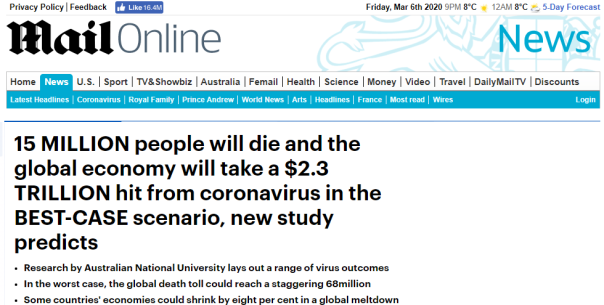Coronavirus is sweeping the globe. Fact. To what speed and what extent varies on a rational perspective of the fear-inducing-media sources we absorb.
Add a dash of gullibility and it can be anywhere from epidemic to the apocalypse.
Yes, people have died.
Yes, it will continue to spread. In the same way, any virus would.

Initially, the casual factor of global infestation was relatively widespread travel amongst patient zero cases.
Despite doomsday media predictions, look closer and you will see that fatalities are roughly 3% . Most of the unfortunate victims had underlying conditions or are simply in the susceptible elderly age bracket. This NOT to say that the loss of any lives should be considered frivolous, or the tragic circumstances behind infections at Nursing homes worldwide wiping out many in the elderly community. It IS to say that media fearmongering does not and will never help.
[UPDATE: As of Friday 11th April – The recorded total of global deaths is currently at 102k out of 1,699, 490 confirmed cases amongst 210 countries and territories worldwide.
The majority of not all currently exercise national wide lockdowns. A large number of world leaders and officials have contracted the virus and it has been proven fatal to people fo all ages and not just those considered at risk i.e. the elderly or those with underlying health conditions. ]
When writing this blog, the vast amount of cases were still residing in China, slowly moving to Korea. Then over the following weeks, Italy was overrun and finally, most of Europe is on lockdown. The causal factor of large outbreaks has been the clustered conditions of those living in confined spaces for a set period of time, such as cruise ships, ski lodges and popular islands resorts. It seems that the largest cases of spread (not fatality) are significantly larger in highly populated cities. As opposed to relatively isolated, rural communities.
As of 10th March, not much has changed to contradict the ratio of contracted cases to death. It seems the peak has travelled from China to Italy… but you can check for yourself here. The underlying point still remains that deaths are a very small percentage of the population. Sadly, the most vulnerable.
[UPDATE: As of Friday 11th April the recorded global deaths total currently stands at 102, 799 out of 1,699,490.
By my very crude ( and probably incorrect calculations) this works out as about 6% of worldwide cases.]
In light of the recent updated as of 10th April 2020, where does the article below published the Daily Mail online ( a supposedly respected British newspaper) earlier in March get its information from?
15 million? According to CNN, as of 6th March, there aren’t even a quarter of a million diagnosed cases worldwide, let alone 3% of that! As of April it works at 102k, about 6% of worldwide cases. Whilst that is an increase of 3% in a month. If this rate continues it would take another 3 months ( multiple April’s total by x3 for each month) to reach anywhere even near a million deaths. That means a further 9 months to reach 9 million in one year. Without any preventative measures or an eventual vaccine or cure maybe?
What does the DM know that everyone else doesn’t?
In reality, stats and accuracy are ultimately irrelevant in a social climate where each individuals’ ego and privilege are pandered to. In our consumer society, our individual importance is elevated by grooming our insecurities and egos with advertising and media on a daily basis. It would require little effort for the same hegemonic system of mass communications that fostered this climate, to tip it into mania. Eventually, the survival instinct kicks in, leading to a mass hysteria that overrides rationality. Then the social priority shifts to protecting the individual consumer’s self-centred needs. We take action and get prepared by buying ‘safety’ in the form of things. Rather than consider the welfare of other fellow humans.
( So soon after Brexit, too).
Thanks to decades of fear-inducing media and strategic advertising tapping our emotional intelligence and appeasing our desires, the modern citizen has learned to price their individual safety over social responsibility or perhaps even human decency. You may have the money to buy all the handwash in the shop because you got there first.. but should you?
. . .Don’t others need it? . . .
Is your life, your survival more important than other people? If so, why?
Interestingly, several key cases of infestation have been in church groups, both Korea and USA. So will the meek still inherit the earth I wonder?
Has ‘I was here first’ or ‘You snooze, you lose’ become the new ‘survival of the fittest’?
Consumerism over Darwinism? Well, both have worked well in the cause of western capitalist ideology so far.
Surely, consumer rights are not superior to human rights?
We don’t see people panic buying medical supplies to give away or making rash charitable donations for others much. There is no such thing as ‘panic-donating’.
The answer is simple enough:
There is nothing wrong with washing your hands, or even stocking up on anti-bacterial handwash but.. leave some for the rest of us?
Global incidents like this bring the world closer in some sense but rather depressingly, inspire the worst too. Cue the instinctual notion of ‘price gouging’. The amateur entrepreneurs soon found a way to profiteer by (presumably) stockpiling and then selling face masks in the rising dawn of a worldwide epidemic.
To their credit, Boots and Lloyds pharmacy have unexpectedly taken steps to counteract this new low in disaster capitalism by rationing certain essential products for better distribution and help preserve more lives instead of making more profit.
It is a shame they have to do so and thus enforce both the necessity and requirement of large retail brands in an ever-tightening yoke of policing the consumer-citizens. It is surely strange days ahead when large corporations show a greater ethical outlook than our own democratically elected authorities. However, according to the Metro, the global corporate giant Amazon have taken no such responsibility.
The government have also ‘officially’ advised there is no need for panic buying when England’s chief medical officer, Professor Chris Whitty revealed behavioural science evidence shows that the ‘response of the British public to disasters and emergencies is extraordinary outbreaks of altruism’. I have seen examples of this in my local social media networks but is this just entirely sentiment based?
If Whitty’s claims prove to be true this is very reassuring and we can all fondly remember the solidarity of rationing during WW2, as spoon-fed to us by the winners of history: Our grandparents because surely no one under the age of 80 was even born before world war II.
Modern-day Black Friday supermarket openings and the dash for the limited supply of cheap HDTVs show our society in a different light though. Quite where Professor Whitty’s optimistic altruism come from is anyone’s guess. My guess is a more ‘simpler time’, perhaps when the NHS was more generously funded.
Interestingly this article I recently located online from Teresa May’s reign of governance a few years back hints at shortsighted governance well before the recent Brexit debacle. If reported accurately, it might reveal how a laissez-faire approach to the economy prior to Brexit transaction helped pave the way for recent disasters.
( *The article seems a legit trustworthy source but due to the absurd nature of contemporary British politics, I really can’t be sure)
The Psychology of Panic Buying is thus:
“Panic buying, Taylor says, is fuelled by anxiety, and a willingness to go to lengths to quell those fears: like queueing for hours or buying way more than you need.”… “It’s probably true that panic buying is ultimately a psychological mechanism to deal with our fear and uncertainty; a way to assert some control over the situation by taking an action.” (Lufkin[2020])
Even government authorities officially advise against the situation perhaps knowing it does little to stifle the public reactions.
The experts say the fact that panic buying is happening at all can prompt people to participate.
“[Panic buying is] getting excessive play in social media and news media, and that amplifies the sense of scarcity, which worsens the panic buying,” Taylor says. “There’s these snowball effects of a further increased sense of urgency.” (Lufkin [2020] BBCOnline).
My cynical side makes me think the government are aware of this but continue to crank out the dogma to ensure a boost of profits that hold up industry performances. Arguably to distract from their own inadequate governance.
Recent official government advice to stay away from social gatherings in pubs and venus has caused anger in the leisure-entertainment industry. By not officially ordering closures or lockdowns like the rest of Europe, Boris faces allegations of appeasing the insurance companies:
“The government’s decision to not force pubs and restaurants to close means that businesses cannot claim cover from insurers.”(Hancock [2020])
So why, in the face of a clearly biological threat that has no relevance to material wealth, do we behave like this?
Here is my theory: Karl Marx coined the idea of the commodity fetish, surviving many definitions and variations. The most relevant here is the idea that people and things change roles; ” social relations take on the character of object relations, and commodities assume the active agency of people”(Apter [1991]P.12).
In short, we sometimes view things more importantly and preferably as we do other humans.. especially products we desire or even fetish.
If you disagree with this, ask yourselves why you don’t give out spare change to beggars but happily save for a new sofa or kitchen?
French theorist (and unwilling postmodernist) Jean Baudrillard [1929-2007] once wrote that modern-day capitalism was so imbued in a system of signs/product and exchange value that our contemporary society might grow too reliant on the symbolic value of /signs products over practical, tangible uses.
People have long bought vastly over-priced Nike trainers for their brand image, or ‘coolness’ instead of the practicality of shoes to wear.
Decades later and younger generations grow-up in a consumer-heavy world where the only means of identity, socio-orientation or even the individual’s understanding of the world around them, is via the brands and products we buy. Thus, the mentality that goes along with them.
If you don’t think this true, go shopping and ask yourselves why you trust Tesco or Asda brands over products you have never heard of? Most of the time it is the same quality contents or a very similar product inside the box.
(Better yet, if you are a ‘native’ English speaker then go shop at Lidl and see if you trust a brand that isn’t even written in English).
Baudrillard argued that the excess of signs and of meaning in late 20th century “global” society had caused (quite paradoxically) an effacement of reality…so now the symbolic value of consumerism has clearly overwritten the practicality of the purchase.
Now….”modern societies are organized around the production and consumption of commodities, while postmodern societies are organized around simulation and the play of images and signs, denoting a situation in which codes, models, and signs are the organizing forms of a new social order where simulation rules. In the society of simulation, identities are constructed by the appropriation of images, and codes and models determine how individuals perceive themselves and relate to other people.” (Kellner[ 2005])
Buying excess food and hand wash will perhaps stave off a virus and keep you fed but it won’t stop you from catching it entirely. With such a divorce from the real, with consumer citizens engaging sigs and images over real-life effacement of reality. Has panic buying has become a new reaction to protecting our own mortality? Since when has buying excess materialism stopped us from being mortal humans? An endless cycle of commodity consumption has arguably meant objectification of the unreal over the real and perhaps even the value of human life? “Baudrillard’s “the end of transcendence” where individuals can neither perceive their own true needs or another way of life.” (Kellner [2005]).
So panic buying becomes the contemporary equivalent of ‘fight or flight’ in our consumer society. To put it shortly….buying things won’t stop you from dying.
We arrive at what Baudrillard might have considered the ‘valorization’ of mortality.
Everything could be resolved easily if we cared more about people than things. . . but where is the money in that?
HERE are instructions to make your own anti-bacterial handwash
Sources cited:
” The psychology of panic buying” By Brian Lufkins [2020] BBC[online
Available online here: https://www.bbc.com/worklife/article/20200304-coronavirus-covid-19-update-why-people-are-stockpiling
“Fetishism in Theory: Marx, Freud, Baudrillard.” Feminizing the Fetish: Psychoanalysis and Narrative Obsession in Turn-of-the Century France, by EMILY APTER, Cornell University Press, ITHACA; LONDON, 1991, pp. 1–14. JSTOR, http://www.jstor.org/stable/10.7591/j.ctt207g6z5.4. Accessed 5 Mar. 2020.
https://www.jstor.org/stable/10.7591/j.ctt207g6z5.4?seq=12#metadata_info_tab_contents
Kellner, Doug [2005] “Jean Baudrillard”, Stanford encylopedia of Philosophy[Online] dated Fri Apr 2005
https://plato.stanford.edu/entries/baudrillard/#SymbExchPostBrea


